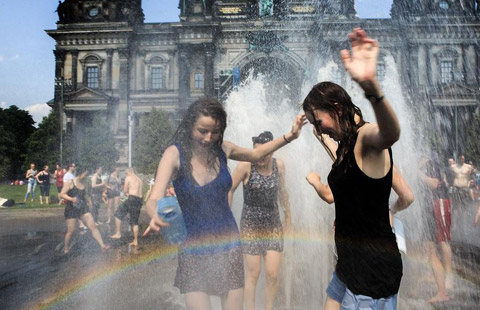Uygur life in the ancient city of Kashgar
Updated: 2015-07-03 10:18
(Xinhua)
|
||||||||
 |
|
A muslim reads the Quran in a mosque in Xi'an, capital of Northwest China's Shaanxi province, June 17, 2015, the first day of the holy month of Ramadan. [Photo/Xinhua] |
It is the Muslim holy month of Ramadan -- a season of fasting and spiritual reflection. Omar Ali, 44, gets up at 5:30 am, just before dawn, to take the only food and drink he will have all day until the sun goes down again.
After prayers at his local mosque, he begins work in his 300-year-old courtyard home in the city of Kashgar, once an important staging post on ancient Silk Road. Ali comes from a long line of terra-cotta craftsmen.
Kashgar, the westernmost city in China, was the center of Uygur civilization for centuries, a place where people came together to trade and spread Islamic learning, on the caravan routes from Europe and Persia to China.
Ali began to learn pottery at his father's knee when he was 13, just after he graduated from junior high school. In the beginning, he made bowls and urinal pots for locals. Over the years, he learned to make vases, tea pots and goblets to cater for the rising number of tourists.
This year, Ramadan falls during the hottest season, but work cannot stop, so Ali continues firing, designing, painting and drawing.
Looking down over the brightly lit city and Tuman River, Ali is excited by the modern landscape but cannot imagine buying an apartment there. Even here at China's furthest extremity, a modern apartment costs around 4,000 yuan ($654 dollars) per square meter.
It takes Ali two or three weeks to produce a full kiln of terra-cotta ware, 400 to 500 pieces. He never calculates how much he earns in a month but it is just enough to feed his wife and keep his three children in school.
Kashgar's old town dates back more than 2,000 years and today is home to more than 200,000 people. Since 2010, renovation at a cost of 7 billion yuan, has transformed the decrepit houses and rendered them earthquake- proof while keeping the traditional Uygur style.
"The more modern Kashgar becomes, the more valuable our craft is to the city," Ali says. What worries him most is a lack of successors.
"Young people, including my son, are not willing to learn pottery," he said. "It is hard work, lonely and you will not get rich from it."
He said he hopes the government can provide fund to help craftsmen improve crafts and innovate technology, so that pottery products can attract more tourists.
The Uygur father ends his 18-hour fast as the sun goes down at 10:10 pm(Beijing Time) when his wife brings melon, pancakes and yogurt to the dining table, against the backdrop of Ali's dazzling colorful pottery.
- Injured ROK tourists in intensive care
- 36 dead, 26 missing after banca capsized in C. Philippines
- Thai navy plans to buy three Chinese subs
- Mass casualties in Indonesian military plane crash
- Japan's LDP lawmaker denounces Abe's security policies
- More than 100 feared dead in Indonesian military plane crash

 Ten photos you don't wanna miss - weekend special
Ten photos you don't wanna miss - weekend special
 US beat Japan 5-2 to win Women's World Cup
US beat Japan 5-2 to win Women's World Cup
 Veterans of World War II honored
Veterans of World War II honored
 The world in photos: June 29 - July 5
The world in photos: June 29 - July 5
 Top 10 most expensive cities in the world
Top 10 most expensive cities in the world
 Italian designer tailors success in China
Italian designer tailors success in China
 People take part in Independence Day parade in Washington
People take part in Independence Day parade in Washington
 Unusual heat wave sweeps across Europe
Unusual heat wave sweeps across Europe
Most Viewed
Editor's Picks

|

|

|

|

|

|
Today's Top News
China measured in response to Clinton hacking claims
Chinese stocks struggle to maintain rally in afternoon
Greece enters uncharted territory after referendum 'no' vote
Chinese embassy warns travelers to be careful in Turkey
China nominates Jin Liqun AIIB's president-designate
For PetroChina, move to Houston pays off
China-France ties 'benefit all'
Concern over US military strategy
US Weekly

|

|






